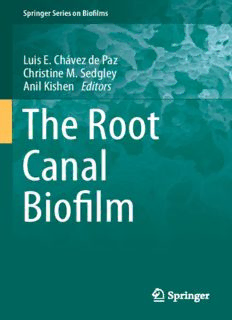
The Root Canal Biofilm PDF
Preview The Root Canal Biofilm
Springer Series on Biofi lms Luis E. Chávez de Paz Christine M. Sedgley Anil Kishen Editors The Root Canal Biofi lm Springer Series on Biofilms SeriesEditors MarkE.Shirtliff,Baltimore,USA PaulStoodley,Southhampton,UnitedKingdom ThomasBjarnsholt,Copenhagen,Denmark More information about this series at http://www.springer.com/series/7142 Luis E. Cha´vez de Paz (cid:129) Christine M. Sedgley (cid:129) Anil Kishen Editors The Root Canal Biofilm Volume 9 Editors LuisE.Cha´vezdePaz ChristineM.Sedgley TheSwedishAcademyforAdvanced DepartmentofEndodontology ClinicalDentistry OregonHealth&ScienceUniversity Gothenburg Portland Sweden Oregon USA AnilKishen DepartmentofClinicalSciences DisciplineofEndodontics UniversityofToronto FacultyofDentistry Toronto Ontario Canada ISSN1863-9607 ISSN1863-9615 (electronic) SpringerSeriesonBiofilms ISBN978-3-662-47414-3 ISBN978-3-662-47415-0 (eBook) DOI10.1007/978-3-662-47415-0 LibraryofCongressControlNumber: 2015953861 SpringerHeidelbergNewYorkDordrechtLondon ©Springer-VerlagBerlinHeidelberg2015 Thisworkissubjecttocopyright.AllrightsarereservedbythePublisher,whetherthewholeorpartof the material is concerned, specifically the rights of translation, reprinting, reuse of illustrations, recitation, broadcasting, reproduction on microfilms or in any other physical way, and transmission or information storage and retrieval, electronic adaptation, computer software, or by similar or dissimilarmethodologynowknownorhereafterdeveloped. The use of general descriptive names, registered names, trademarks, service marks, etc. in this publicationdoesnotimply,evenintheabsenceofaspecificstatement,thatsuchnamesareexempt fromtherelevantprotectivelawsandregulationsandthereforefreeforgeneraluse. Thepublisher,theauthorsandtheeditorsaresafetoassumethattheadviceandinformationinthis book are believed to be true and accurate at the date of publication. Neither the publisher nor the authors or the editors give a warranty, express or implied, with respect to the material contained hereinorforanyerrorsoromissionsthatmayhavebeenmade. Printedonacid-freepaper Springer-Verlag GmbH Berlin Heidelberg is part of Springer Science+Business Media (www.springer.com) Luis E. Cha(cid:1)vez de Paz would like to dedicate his contribution to Patricia, Luis Diego, Nicola(cid:1)s, and Andre´s, for all their encouragement and support. Anil Kishen acknowledges Arunthathi, Abinav, and Aaryan for their encouragement and patience. Christine Sedgley dedicates her contribution to Victor, her greatest supporter. ThiSisaFMBlankPage Preface Biofilms are recognized as one of the earliest ecosystems on earth. They are composed of aggregates of microbial cells enclosed in a self-produced matrix adherent to a surface. Root canal biofilms are complex polymicrobial structures adherenttotherootcanalsurfacethatareformedbymicroorganismsinvadingthe pulpalspaceofteeth.Importanthistopathologicalstudiespublishedseveraldecades agofirstnotedthepresenceofadherentcellsonrootcanalsurfaces.However,itwas not until the introduction of advanced microscopy and molecular biology tech- niques that they were recognized to be the dominant form of microbial life in the rootcanalsystem.Similarly,itwasonlyinthepastdecadethatrootcanalinfections were acknowledged to be biofilm infections. Subsequently, recent studies have shownthatrootcanalbiofilmsareassociatedwithpersistentendodonticinfections andassucharelikelytobesignificantcontributingfactorsdeterminingtheoutcome ofendodontictreatment. Concertedeffortstostudyrootcanalbiofilmshavebeenmadeinthepastdecade resultinginthepublicationofobservationalandexperimentalstudiesthatdetailthe morphology and biology of these structures in infected root canals. In addition to confirmingthatbacteriainrootcanalsdonotexistinfree-floatingplanktonicstates as previously assumed, this new information on root canal biofilm infections has providedanopportunitytoreevaluateconventionalclinicalprotocolsandimprove endodontictherapeuticmeasures. The aim of this volume is to provide a current understanding of the basic scientific aspects of root canal biofilm biology within a clinically applicable context. This volume is divided into three sections. Part I discusses the basic biology of root canal biofilms and addresses key questions about the ecological andphysiologicalaspectsthatplayaroleintheformationandresistanceofbiofilms inrootcanals(chapter“EcologyandPhysiologyofRootCanalMicrobialBiofilm Communities”). The last two chapters of this section review the general mecha- nismsofbiofilmadhesion(chapter“MolecularPrinciplesofAdhesionandBiofilm Formation”),andthemechanismsofantimicrobialresistanceinendodontic-related pathogens(chapter“AntimicrobialResistanceinBiofilmCommunities”).InPartII, vii viii Preface attentionfocusesonobservationalandexperimentalevidenceofrootcanalmicro- bial biofilms. Part II starts with an overview of observations of biofilms in root canalsusingscanningelectronmicroscopy(chapter“TheUseofScanningElectron Microscopy(SEM)inVisualizingtheRootCanalBiofilm”).Evidenceforbiofilm formation in histopathological preparations, and a review of novel molecular techniques to identify bacteria in biofilm populations in clinical samples, is pro- videdinchapter“BacterialBiofilmsandEndodonticDisease:Histobacteriological and Molecular Exploration”. Part II closes with a description of common experi- mental approaches utilized to study root canal biofilms including in vitro biofilm modeling techniques (chapter “Laboratory Models of Biofilms: Development and Assessment”) and examines the challenges behind anatomic complexities in root canals as these may play a role in root canal disinfection (chapter “Root Canal Anatomy: Implications in Biofilm Disinfection”). The final section, Part III, con- sidershowinfectionscausedbyrootcanalbiofilmsareclinicallytreatedandreview theimplementationofnovelanti-biofilmapproaches.Anoverviewoftheoutcome ofpersistingrootcanalbiofilminfectionsandappropriatetreatmentoptionsisfirst presented (chapter “Biofilm-Associated Infections in Root Canals: Treatment and Outcomes”). This is followed by an explanation of the influence of clinical irri- gation techniques (chapter “Root Canal Irrigation”) and the importance of inter- appointment medication on root canal biofilms (chapter “Inter-appointment Medi cationwithCalciumHydroxideinRoutineCasesofRootCanalTherapy”).Finally, innovativemethodsanddevicesdirectedtowardstheremovalofbiofilmsfromroot canals are discussed (chapter “Advanced Therapeutic Options to Disinfect Root Canals”). This volume will be of interest to a wide range of endodontics-related profes- sionals,includingbasicmicrobiologists,clinicalmicrobiologists,andclinicians,and shouldbeusefultoundergraduate,postgraduate,andpostdoctoralscientistsworking atthefrontierofanewunderstandingoftheroleofmicrobialbiofilmsinendodontic disease. Gothenburg,Sweden LuisE.Cha´vezdePazDDS,MS,PhD Portland,USA ChristineSedgleyMDS,MDSc,FRACDS, MRACDS(ENDO),PhD Toronto,Canada AnilKishen March2015 Acknowledgements It has been a fascinating journey since we started with the idea to edit a book dedicatedtomicrobialbiofilmsformedinrootcanals.Firstofallwewishtothank alltheauthorsforprovidingtheirexcellentcontributions,withouttheirdedication andinvolvementinthisprojectitwouldn’thavebeen possibletocompleteit.We wish to give a special acknowledgement to Dr. William Costerton, former book serieseditor,forproposingthatitistimelytopublishabookonrootcanalbiofilms. TheeditorsassemblingtherootcanalbiofilmprojectatacoffeeshopattheHynesConvention CenterinBoston,duringtheAmericanAssociationofEndodontistsAnnualSession,April2012 ix
Description: